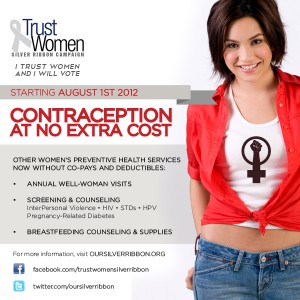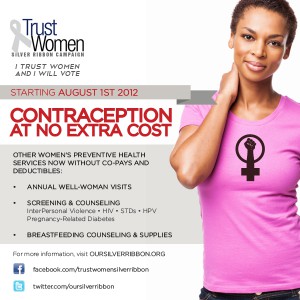Trust Women/Silver RibbonCampaign
Infographics – Please post on Facebook! And Like Us on our Facebook page.

- Contraception Without Co-pays. See www.oursilverribbon.org for more info

- Contraception Without Copays! See www.oursilverribbon.org for more info
INFO
Commentary on Contraceptive Insurance Mandate – by the Medical Care Section of the American Public Health Association by Ellen R. Shaffer, Arlene Ash, Mona Sarfaty, Medical Care, Volume 50, Number 7, July 2012. Excerpt:
Contraception is a fundamental health care service and a basic public health measure. The ability to plan, start, space, and discontinue bearing children has transformed everyday life for women, families, and communities. It has vastly enhanced women’s autonomy, professional and educational achievement, and emotional satisfaction and helped extend their life span.
Click here for Contraceptive Insurance by Shaffer et al.
Challenges in Congress and in the Courts
The House of Representatives continues to challenge contraceptive coverage: http://www.washingtonpost.com/blogs/plum-line/post/the-war-on-contraception-is-back/2012/07/19/gJQAwCzMwW_blog.html
A federal court in Colorado may issue a temporary injunction on the contraception benefit for a single private, for-profit company: http://www.washingtonpost.com/blogs/ezra-klein/wp/2012/07/28/a-federal-court-ruled-against-the-contraceptive-mandate-heres-what-happens-next/
Women’s Preventive Services: Required Health Plan Coverage Guidelines, Health Resources and Services Administration (HHS)
Non-grandfathered plans and issuers are required to provide coverage without cost sharing for these services in the first plan year (in the individual market, policy year) that begins on or after August 1, 2012.
|
Type of Preventive Service
|
HHS Guideline for Health Insurance Coverage
|
Frequency
|
| Contraceptive methods and counseling.** |
All Food and Drug Administration approved contraceptive methods, sterilization procedures, and patient education and counseling for all women with reproductive capacity. |
As prescribed. |
| Well-woman visits. |
Well-woman preventive care visit annually for adult women to obtain the recommended preventive services that are age and developmentally appropriate, including preconception and prenatal care. |
Annual |
| Screening for gestational diabetes. |
Screening for gestational diabetes. |
In pregnant women between 24 and 28 weeks of gestation and at the first prenatal visit for pregnant women at high risk for diabetes. |
| Human papillomavirus testing. |
High-risk human papillomavirusDNAtesting in women with normal cytology results. |
Screening should begin at 30 years of age. Then no more frequently than every 3 years. |
| Counseling for sexually transmitted infections. |
Counseling on sexually transmitted infections for all sexually active women. |
Annual. |
| Counseling and screening for human immune-deficiency virus. |
Counseling and screening for human immune-deficiency virus infection for all sexually active women. |
Annual. |
| Breastfeeding support, supplies, and counseling. |
Comprehensive lactation support and counseling, by a trained provider during pregnancy and/or in the postpartum period, and costs for renting breastfeeding equipment. |
In conjunction with each birth. |
| Screening and counseling for interpersonal and domestic violence. |
Screening and counseling for interpersonal and domestic violence. |
Annual. |
* Refer to recommendations listed in the July 2011 IOM report titled Clinical Preventive Services for Women: Closing the Gaps concerning individual preventive services that may be obtained during a well-woman preventive service visit.
** Group health plans sponsored by certain religious employers, and group health insurance coverage in connection with such plans, are exempt from the requirement to cover contraceptive services. A religious employer is one that: (1) has the inculcation of religious values as its purpose; (2) primarily employs persons who share its religious tenets; (3) primarily serves persons who share its religious tenets; and (4) is a non-profit organization under Internal Revenue Code section 6033(a)(1) and section 6033(a)(3)(A)(i) or (iii). 45 C.F.R. §147.130(a)(1)(iv)(B).
http://www.healthcare.gov/law/resources/regulations/womensprevention.html
Some Important Details
This preventive services provision applies only to people enrolled in job-related health plans or individual health insurance policies created after March 23, 2010. If you are in such a health plan, this provision will affect you as soon as your plan begins its first new “plan year” or “policy year” on or after September 23, 2010.
Top things to know about preventive care and services:
- Grandfathered plans: If your plan is “grandfathered,” these benefits may not be available to you.
- If you have health coverage from a plan that existed on March 23, 2010 — and that has covered at least one person continuously from that day forward — your plan may be considered a “grandfathered” plan. Grandfathered plans can lose their grandfathered status if they make certain significant changes that reduce benefits or increase costs to consumers. http://www.healthcare.gov/law/features/rights/grandfathered-plans/index.html
- Network providers: If your health plan uses a network of providers, be aware that health plans are required to provide these preventive services only through an in-network provider. Your health plan may allow you to receive these services from an out-of-network provider, but may charge you a fee.
- Office visit fees: Your doctor may provide a preventive service, such as a cholesterol screening test, as part of an office visit. Be aware that your plan can require you to pay some costs of the office visit, if the preventive service is not the primary purpose of the visit, or if your doctor bills you for the preventive services separately from the office visit.
- Questions: If you have questions about whether these new provisions apply to your plan, contact your insurer or plan administrator. If you still have questions, contact your state insurance department.
- Talk to your health care provider: To know which covered preventive services are right for you — based on your age, gender, and health status — ask your health care provider
http://www.healthcare.gov/law/features/rights/preventive-care/index.html
What is a Grandfathered Health Plan?
Fact Sheet: Keeping the Health Plan You Have: The Affordable Care Act and “Grandfathered” Health Plans
http://www.healthreform.gov/newsroom/keeping_the_health_plan_you_have.html
Health Reform.Gov explains that some health plans were “grandfathered” when the ACA was passed in on March 23, 2010, to accommodate people who wanted to keep the health care they had. A federal regulation allows plans that existed on March 23, 2010 to innovate and contain costs by allowing insurers and employers to make routine changes without losing grandfather status. Plans will lose their “grandfather” status if they choose to significantly cut benefits or increase out-of-pocket spending for consumers – and consumers in plans that make such changes will gain new consumer protections. This Fact Sheet describes the changes that would cause plans to lose their grandfathered status. It is estimated that 90% of plans eventually will convert by 2014.
NWLC Fact Sheet: “Contraceptive Coverage in the Health Care Law: What Happens on August 1, 2012?” http://bit.ly/LO2IDG
NWLC Resource: “How To Find Out If and When Your Health Plan Will Begin Covering Women’s Preventive Services with No Co-Pay” http://bit.ly/MmyCnV
Brochure: How the Health Care Law is Helping Women and Their Families http://bit.ly/N37Sas
Poll: By Hart Research for Planned Parenthood and National Women’s Law Center about attitudes towards contraceptive coverage. http://bit.ly/N37SXW
CAMPAIGNS
Recommended Twitter hashtags: #trstwmn #NoCoPay #Aug1 If there’s space: #herhealth #worryfreesex #mybodymyvote
Sample Tweets:
#worryfreesex No birth control co-pays starting Aug 1, just get the right partner http://bit.ly/MJfQvg #trstwmn
Your life, your decision: plan/start/space/stop having children. No more contraceptive co-pays Aug 1http://bit.ly/MJfQvg #NoCoPay
Contraception: basic & necessary for public health, free Aug 1 http://bit.ly/MJfQvg #herhealth Contraception: basic & necessary for women’s health, free Aug 1 http://bit.ly/MJfQvg #trstwmn #herhealth Decide it, live it: contraception free from co-pays Aug1 http://bit.ly/MJfQvg #Aug1 Women’s work, life, schooling, & happiness are tied to contraception — free > Aug 1 http://bit.ly/MJfQvg #trstwmn
Contraception: covered by insurance & co-pay free starting Aug 1http://bit.ly/MJfQvg #trstwmn #herhealth
Reproductive rights & contraception go together. No co-pays starting Aug 1 http://bit.ly/MJfQvg #trstwmn #herhealth
We fought for this: no co-pays on contraception starting Aug 1 http://bit.ly/MJfQvg #trstwmn #herhealth
Bishops hate it, women love it: co-pay free contraception on Aug 1 http://bit.ly/MJfQvg #trstwmn #herhealth
Contraception coverage in health insurance IS health care. No co-pays start on Aug 1 http://bit.ly/MJfQvg #trstwmn #herhealth
Time to double down the fight for women’s health and reproductive rights #trstwmn #herhealth Full coverage for contraceptive health care: good for women, good for families #trstwmn #herhealth When we fight we win: No co-pays starting Aug 1 #trstwmn #herhealth http://on.fb.me/MgCJXa I trust women & I vote http://on.fb.me/T1A1DY #2012 or #GOTV2012 #trstwmn #herhealth I trust women & I will vote http://on.fb.me/PhtQHn #2012 #trstwmn #herhealth
Religious Coalition for Reproductive Rights – I’m a Fan of Birth Control! Support the reliigious freedom of women who use birth control. Help show that religion in America is gloriously diverse and no one set of beliefs about contraception or anything else can dominate our laws and policies. http://www.fanofbc.org/
Center for American Progress: Go to our Twibbon page and add your Free the Pill icon to your profiles: http://twibbon.com/join/Free-the-Pill
Sample tweet:#FreeThePill: Birth control is covered w/no co-pay! TY #Obamacare. Add your #Twibbon: http://twibbon.com/join/Free-the-Pill. @CAPcongress #fem2
National Council for Jewish Women(NCJW): Questions? Contact Amy Cotton, Amy@ncjwdc.org
Coalition to Protect Women’s Health Like Us on Facebookwww.facebook.com/TheCPWH Follow us on Twitterhttp://www.twitter.com/TheCPWH





